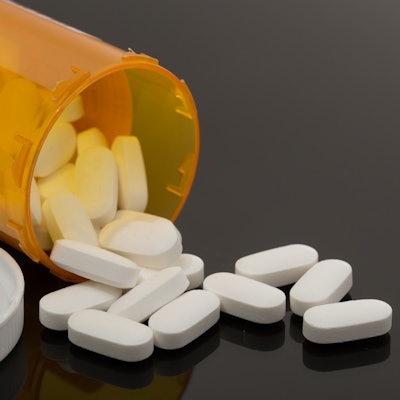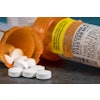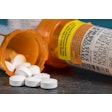
About half of opioid prescriptions written by dentists in the U.S. exceeded two-day supply recommendations identified in previous research, according to a new study published online February 3 in the American Journal of Preventive Medicine.
Dentists commonly prescribe opioids with approximately one-third of patients having received more powerful medications than necessary for the type of pain they experienced, according to the study authors.
"Up to half of opioids received at the time of dental visits are inconsistent with guidelines on the appropriate use of opioids for acute pain," wrote the authors, led by Katie Suda, PharmD, of the University of Pittsburgh School of Medicine.
Dentists write 1 in 10 opioid prescriptions in the U.S. Dentists prescribe 12% of all opioid prescriptions, which make them the second-highest prescriber behind family doctors. Though the ADA and researchers recommend nonopioid analgesics such as nonsteroidal anti-inflammatory drugs to manage dental pain, dentists frequently prescribe opioids, specifically after third-molar extractions.
Researchers used Truven Health MarketScan Research Databases to assess about 550,000 dental visits by adult patients between 2011 and 2015 to evaluate dentists prescribing habits. The visits occurred prior to the U.S. Centers for Disease Control and Prevention implemented its pain management guidelines, which recommend nonopioid analgesics for oral pain when possible, in 2016. It recommended the use of low-potency opioids and suggested only a three-day supply or less be prescribed when a stronger medication is needed.
About 53% of dental visits exceeded the recommended days' supply. Of those cases, about 30% were prescribed in cases where the patients experienced mild pain, according to the findings.
Though the study shines a light on dentists' prescribing habits, the study has limitations, including the sample of patients. Also, the study included patients with dental, medical, and prescription coverage. Therefore, the results may not be representative of uninsured patients and people with Medicaid and Medicare benefits.
Additionally, opioid overprescribing by dentists did not change during the study period. Therefore, the study results should initiate a call to action to professional organizations and public health and advocacy groups to improve the guidelines for prescribing opioids for oral pain, the authors wrote.
"Evidence-based interventions tailored to dentists and oral pain are urgently needed to curtail excessive opioid prescribing by U.S. dentists," they wrote.




















